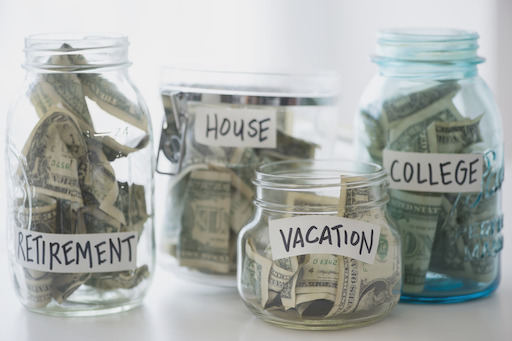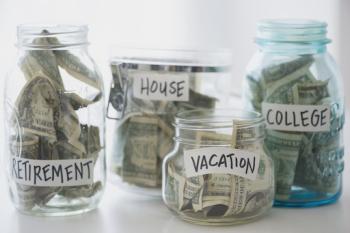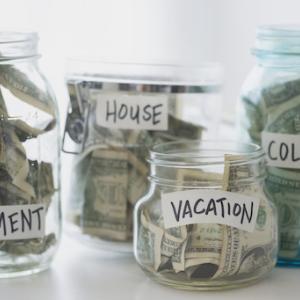Where is the best place to park cash right now?
Whether you sold something recently, have money lying in a bank account, received unexpected income, or have extra cash burning a hole in your pocket this article will try to inform you of a few of the best places to park cash right now.
Personal savings in the United States exploded during 2020 amid lockdowns and increased stimulus. Nonetheless, an increase in available cash has been met with historically low interest rates.
Many people resort to putting money in a savings or checking account when they're looking to park cash. However, the average annual interest rate for a savings account in the United States is just 0.06% according to the Federal Deposit Insurance Corp. A $10,000.00 balance would accumulate only $6 in interest annually.
So, is there a better option for where to park cash right now?
The answer largely depends on what you plan to do with the cash, what other investments and accounts you have, and how much cash you have available.
The first thing that any person should do with the cash they are looking to park is reduce or eliminate high-interest debt. By paying off high-interest debt this guarantees a return of investment equivalent to the interest rate being charged on the debt. But this doesn’t include low-interest debt like mortgages and most student loans because the interest rates are so low there is little incentive to pay these off early when better opportunities are available.
The next best place to park cash is by storing money in an emergency fund. An emergency fund should cover six to nine months of expenses. Experts disagree on exactly how much should be in an emergency fund with some saying as little as three and others saying a full year is necessary, however six to nine months is a happy medium for most individuals. A solid emergency fund will allow individuals to take greater risks and protect themselves against possible factors outside of their control. Generally speaking the best place to hold money for an emergency fund is in a high-yield savings account. More on those later.
For those looking to bolster their retirement savings it makes a lot of sense to park extra cash in either a Traditional IRA or Roth IRA to take advantage of the benefits offered by each. However, contribution limits prevent individuals from storing large amounts of money in these types of accounts and in most cases the money won’t be able to be withdrawn without penalties until retirement. Regardless, contributing extra cash to either a Roth IRA or Traditional IRA makes sense for those looking to save more for retirement, want to reduce their tax bill, or are unsatisfied with other opportunities to store cash.
If you are looking for a more short term solution to park your money look no further than a high yield savings account. These accounts typically offer the same liquidity as a normal bank account, have low or no fees, and earn much higher interest rates than traditional accounts. Many high-yield savings accounts offer rates near 0.50%, almost nine times the national average. (See here for a list of some options.) The trade-off for this type of account is limited physical presence and an online focused-experience. However, this is the best option for money that needs to be easily accessible at any time in the near future.
Two alternatives to a high yield savings account include cash management and money market accounts. Both of these types of accounts function in a similar manner to a high yield savings account and offer slightly higher interest rates. The difference is largely based on where the money is kept. Most money market or cash management accounts are typically invested into very low risk investments by the institution the account is managed by, cash, and cash equivalents. Money market accounts usually have higher minimums than both high yield savings accounts and cash management accounts, and may limit the number of transactions per month. (Here is a list of some money market accounts and a list of some cash management accounts.)
The next best option for where to park cash depends on your time horizon. For money that can be left untouched for a period of longer than one year there are several different options to invest your money. These include certificates of deposit, bonds, treasury securities, and bond funds.
Certificates of Deposit, or CDs, are typically the most straightforward tool to save money for a medium time horizon while earning a larger return than a bank account can offer. In return for locking up your money for a specified period of time you are paid a predetermined interest rate on your money. (Check out this list for some common CD terms and rates.) Treasury securities, bonds, and bond funds, all offer exposure to the same type of investment product with investment risk ranging from US-backed treasury securities to junk corporate bonds. While bonds and treasury securities can offer better returns than some other options to park cash, they have longer term maturity dates with a more complicated purchasing process. Most investors would be best suited investing in a highly liquid bond fund that provides broad diversification and has low fees to maximize returns and ease of use.
Another alternative place to park your cash if your time horizon is greater than five years is to invest into a broad market stock exchange-traded fund or index fund like $VTI, $IVV, or $FZROX. These funds give you enough diversification to significantly reduce risk while also maximizing returns of the market with low-fees and tax-efficient strategies.
Finally, after exhausting all other options of any of the above places should you consider parking additional cash in your traditional bank or checking account. While it’s important to keep these accounts funded well enough for regular expenses it makes little sense to store large amounts of money here unless it’s temporary or a large purchase is imminent.
Max Provencher is a senior at Searsport District High School. He currently serves as the Chapter President and founding member of the Searsport Future Business Leaders of America, Vice President of Maine FBLA, and serves as the FBLA National Treasurer. He helps to promote business education and financial literacy to over 200,000 members across the globe. Max is an avid investor in stocks and bonds, and works hard to promote financial literacy in schools as a member of the Maine DOE Student Cabinet. In his spare time he enjoys playing golf and running with his Airedale terrier, Ginger.
































